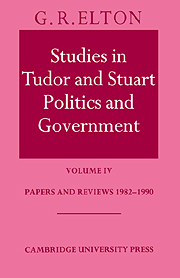Book contents
- Frontmatter
- Contents
- Preface
- Acknowledgments
- Abbreviations
- I POLITICS AND THE REFORMATION
- 49 The State: Government and Politics under Elizabeth and James
- 50 Lex Terrae Victrix: the Triumph of Parliamentary Law in the Sixteenth Century
- 51 Human Rights and the Liberties of Englishmen
- 52 King Henry VII
- 53 Wales in Parliament, 1542–1581
- 54 Piscatorial Politics in the Early Parliaments of Elizabeth I
- 55 English National Self-consciousness and the Parliament in the Sixteenth Century
- 56 Thomas More and Thomas Cromwell
- 57 Lancelot Andrewes
- 58 Persecution and Toleration in the English Reformation
- 59 Auseinandersetzung und Zusammenarbeit zwischen Renaissance und Reformation in England
- 60 Humanism in England
- 61 Luther in England
- 62 Die europäische Reformation: Mit oder ohne Luther?
- II ON HISTORIANS
- Index of Authors Cited
- General Index
50 - Lex Terrae Victrix: the Triumph of Parliamentary Law in the Sixteenth Century
Published online by Cambridge University Press: 03 February 2010
- Frontmatter
- Contents
- Preface
- Acknowledgments
- Abbreviations
- I POLITICS AND THE REFORMATION
- 49 The State: Government and Politics under Elizabeth and James
- 50 Lex Terrae Victrix: the Triumph of Parliamentary Law in the Sixteenth Century
- 51 Human Rights and the Liberties of Englishmen
- 52 King Henry VII
- 53 Wales in Parliament, 1542–1581
- 54 Piscatorial Politics in the Early Parliaments of Elizabeth I
- 55 English National Self-consciousness and the Parliament in the Sixteenth Century
- 56 Thomas More and Thomas Cromwell
- 57 Lancelot Andrewes
- 58 Persecution and Toleration in the English Reformation
- 59 Auseinandersetzung und Zusammenarbeit zwischen Renaissance und Reformation in England
- 60 Humanism in England
- 61 Luther in England
- 62 Die europäische Reformation: Mit oder ohne Luther?
- II ON HISTORIANS
- Index of Authors Cited
- General Index
Summary
Even before the sixteenth century, the king's high court of Parliament had become England's legislative instrument: that part of the king's government which defined the law of the land by making and repealing statutes that constituted the ultimate definition of the common law. The fact that law developed and changed much more commonly in the course of litigation or discussion among judges and counsel is here irrelevant. The pronouncements of Parliament may have been rare by comparison and may often have summed up innovations carried forward in the courts, but when it set its seal upon some item of the law it established a certainty far more definite than the precedents created by judgements. In the course of the sixteenth century, that certainty and control over the law grew noticeably more positive, as printing fixed the text of statutes and compelled all concerned to respect their precise wording. All this has been set out before, but one important issue deserves further attention. Parliament might hold ultimate authority over the common law, but its universal authority over the realm for that very reason depended on the exclusive authority of the common law within that realm. At the beginning of the century that authority was still limited by the independent force of rival legal systems, ranging from local customs to the canon law of the Universal Church, with all of which systems the common law had before this engaged in battles without ever winning an outright victory.
- Type
- Chapter
- Information
- Studies in Tudor and Stuart Politics and Government , pp. 37 - 57Publisher: Cambridge University PressPrint publication year: 1992



